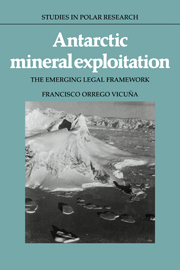Book contents
- Frontmatter
- Contents
- Preface
- Acknowledgement
- Abbreviations
- Part I The international legal framework of Antarctic co-operation and the development of resources
- 1 The evolution of the system of Antarctic co-operation and the influence of the development of resources
- 2 The Antarctic legal system and the development of a norm-creating function in the field of natural resources
- 3 Antarctic sovereignty and jurisdiction: new approaches for a resources policy
- 4 The Law of the Sea in the Antarctic Treaty system: its evolution in the light of the resources regime
- Part II Alternative approaches to the conservation and development of Antarctic minerals: the process of internal accommodation
- Part III Issues and options relating to the external accommodation
- Appendix 1 The Antarctic Treaty
- Appendix 2 Table of signatures and ratifications
- Table of Cases
- Table of Statutes and national legislation
- Table of Treaties
- Bibliography
- Index
1 - The evolution of the system of Antarctic co-operation and the influence of the development of resources
Published online by Cambridge University Press: 04 November 2009
- Frontmatter
- Contents
- Preface
- Acknowledgement
- Abbreviations
- Part I The international legal framework of Antarctic co-operation and the development of resources
- 1 The evolution of the system of Antarctic co-operation and the influence of the development of resources
- 2 The Antarctic legal system and the development of a norm-creating function in the field of natural resources
- 3 Antarctic sovereignty and jurisdiction: new approaches for a resources policy
- 4 The Law of the Sea in the Antarctic Treaty system: its evolution in the light of the resources regime
- Part II Alternative approaches to the conservation and development of Antarctic minerals: the process of internal accommodation
- Part III Issues and options relating to the external accommodation
- Appendix 1 The Antarctic Treaty
- Appendix 2 Table of signatures and ratifications
- Table of Cases
- Table of Statutes and national legislation
- Table of Treaties
- Bibliography
- Index
Summary
Stages of development in the Antarctic
Man's presence in the Antarctic continent falls into a number of periods or stages which are well defined in terms both of the nature of the activities undertaken and of the corresponding legal and political requirements for the organization of human work in this territory.
The first of these stages was that of discovery and geographical exploration, a period which has with considerable justification been termed the ‘heroic’ age of the development of the Antarctic; then came the stage of scientific research and, more recently, the stage of the utilization and exploration of the natural resources of the continent. The first of these stages is now largely completed, at least as far as exploration of the traditional type is concerned. The second, however, is at present in process of development, taking a number of different forms. Indeed, it can be seen that the original emphasis on pure research has been gradually supplanted by a different emphasis, even more closely linked to resources-related applications.
In the course of this development, the third of the stages mentioned has begun to emerge more clearly and can today be said to be the main topic of discussions on the Antarctic both between countries directly concerned in activities in that continent and within the scope of other forums of the international community.
- Type
- Chapter
- Information
- Antarctic Mineral ExploitationThe Emerging Legal Framework, pp. 3 - 38Publisher: Cambridge University PressPrint publication year: 1988



